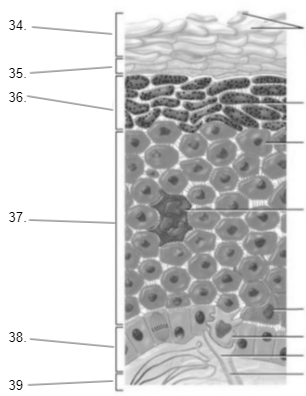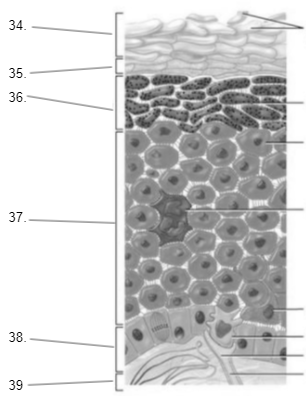This structure contracts and causes the hair to stand up straight
arrector pili muscle
The superficial portion of the skin that is composed of 4-5 layers
epidermis
A result of the flaking off of the stratum corneum
dandruff
what is the fluid produced from sebaceous glands called
sebum
This pigment can vary based on genetic factors and can increase with UV exposure.
melanin
The part of the hair that stick out past the skin
hair shaft
The layer below the dermis that contains adipose (fat) tissue
hypodermis
skin reaction due to human herpes virus 1
cold sore
These sweat glands are found all over the body and help to regulate body temperature
eccrine glands
The structure found in the dermis that surrounds the hair root
hair follicle
These glands are directly connected to the hair follicle and help prevent the skin and hair from drying out
sebaceous glands
Which layer of the skin is found directly below the stratum basale
dermis
least malignant but most common skin cancer
basal cell carcinoma
These sweat glands are found in the axillary and genital regions
apocrine glands
Which membranes contain a double layer (visceral & parietal) that surrounds organs that move
serous membrane
Fingerlike projections that increase the surface area of the epidermis
dermal papillae
Which layer is #34

Stratum corneum
Least common, but most deadly skin cancer
malignant melanoma
These glands can also be called sweat glands
sudoriferous glands
Which type of membrane is moist and lines cavities that open up to the exterior body.
mucous membrane
Blood capillaries that allow for nutrient and gas exchange at the base of the epidermis
capillary loops
Which layer of the epidermis is only present in thick skin
stratum lucidum
Burn in which skin appears red and blistered, epidermis, and superficial dermis are damaged
2nd degree burn
These glands can also be called oil glands
sebaceous glands
keratinocytes
Cells that come in contact with the sensory nerves
merkel cells, or tactile epithelial cells
Which layer is #37

stratum spinosum
Skin reaction, due to chemicals or allergic reaction: red, swollen, itchy skin.
contact dermatitis
What are the two types of glands that become active at puberty
apocrine glands, and sebaceous glands
These cells found in the epidermis participate in immune response
epidermal dendritic cells, or intraepidermal macrophages